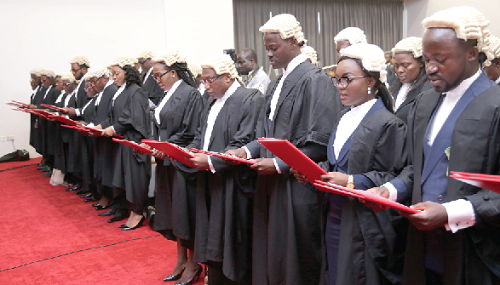Lawyers must brace for competition under AfCFTA – UPSA Law School Dean
Lawyers must brace for competition under AfCFTA – UPSA Law School Dean

The Dean of the UPSA Law School and Chairman of the Ghana Forum of the African Bar Association, Professor Kofi Abotsi has underscored the need for lawyers on the continent to brace themselves for the competition that comes with the operationalization of the African Continental Free Trade Area (AfCFTA).
The AfCFTA would reshape markets and economies across the continent, and boost output in various sectors. And particularly for the legal sector, it is expected to expand the market – demand for legal services is expected to intensify. This however is accompanied by a level of competition.
Professor Abotsi noted that legal practitioners and firms unprepared in terms of cross-border transactional practices may miss out on the advantages of the policy.
“These are exciting times, but they are also dangerous moments for the unprepared lawyer or law firm. Talks about competition cos enabled by of the opening of markets. “There is a danger that many law firms are gonna l collapse because they cannot stand the stiffness of the competition. As we sit in Ghana, we may lawyers from Kenya who may be doing business in town. As Nigeria shows up in town, the unprepared Ghanaian lawyer may simply find it too difficult to survive within the scheme of the existing markets. As Rwandese show up in Ethiopia, Ethiopians must brace for the competition posed by the new dynamics. The reality is that we have gotten to a point where the barriers to competition are being removed, the restrictions to the border are being eroded, and at this stage, it is the competitiveness of the lawyer that will stand the test of time,” he explained.
He was speaking at the international lecture organized by the African Bar Association with collaboration from the Ghana Bar Association and the UPSA Law School on the theme, ‘Dispute Settlement under AfCFTA and the New Legal Market.’
Recognizing an immediate need for interventions, he noted that legal education and training ought to change, as well as professional values.
“Beyond these, lawyers need to adapt to the changing complexities of cross-border practice including the cultural dynamics of inter-firm cooperation in the handling cases together. It so happens that sometimes transactions even break down because inter-firms don’t seem to have the same cultural understanding of things. There are all kinds of tensions, and they just don’t seem to have a certain global understanding of things and a certain global trend in thinking. And I have to be honest with this, firms out there do not seem to take us that seriously. They already come to the table with their stereotypes, their prejudices, with things they’ve heard. Unfortunately very often we confirm them. And we confirm them when they ask that certain things be submitted by a certain date, and we then we’ll remind them that it’s a holiday in my country. And they clearly can see that we are not serious.”
“That competitiveness will have to reflect the dynamins I’ve already mentioned – the caliber of training, the work ethic, the understanding and experience of global trends, going beyond boundaries, having an interdisciplinary of things, and being an out-of-box lawyer. For it is only those who are prepared to venture out and endure and embrace the newness of things, who will survive."


